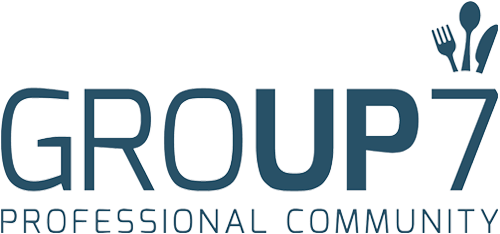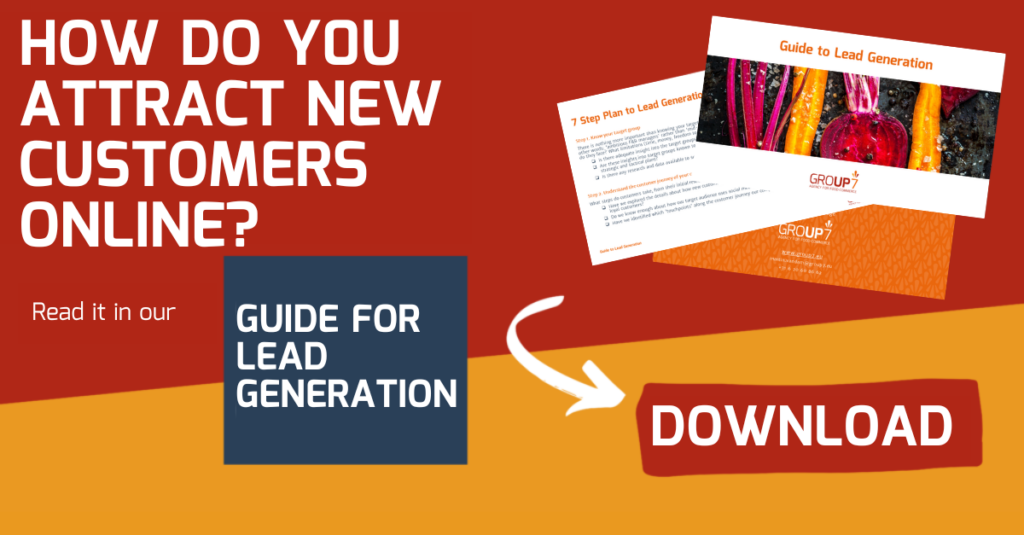Lead generation is the process of identifying potential customers and sparking their interest in an organisation’s products or services. It is a process where interested people are filtered out from the masses.
A lead is a person
A lead is a person who is interested in your product or service. Let that sink in for a moment: You are not looking to attract a company, but a person within that company. We can only speak of having a lead if someone has expressed an interest.
Please keep in mind that any random new contact is not necessarily a lead yet. A lead is someone you have more information about and now you got to know that he is relevant for your business. For example when you know that he is a decision maker in his company, and the company is an outlet where your product(s) would fit on the menu.
A lead is therefore more valuable than just a contact!
Why lead generation?
The fact of the matter is, you have to start at the beginning: finding one person who is interested in your product. Anyone looking to bring in new customers will need to generate leads.
In practice, we see that many sales teams – field sales, account managers, representatives – tend to focus the lion’s share of their time on existing customers as well as on prospective customers they already know.
If growing your customer base and retaining existing customers is your goal, then that’s great! But if you want to grow your number of customers, or even grow faster than the market, you will have to look for new customers using a deliberate process, through lead generation.
Nowadays, lead generation occurs almost exclusively online. In a wide variety of ways. We will now delve further into that, providing only strong examples.
10 ways to generate online leads
1. Offering a scan or taking a quiz
A creative way of attracting leads is by using an online scan or quiz. Visitors to your website often enjoy filling in these kinds of scans and are curious to see how it works.
Gio Coffee, for example, has a selection tool that asks simple questions before taking you to a personalised coffee deal. The questions have been kept very simple, so as to prevent the process from taking too long and getting abandoned. After question 4, you see the results appear: a personalised coffee deal that will be sent via email.
- Do you offer tableware and cutlery? Create a selection tool based on concepts, ambience and budgets.
- Sell beverages? Then make a product range recommendation based on 5 questions. And do a personal follow-up for a more in-depth analysis.
- Great tip for anyone: run a giveaway promotion using 1 to 3 questions.
2. Provide an online course
Anyone looking to build an image as an expert can start sharing their knowledge with potential customers. This is another great way of generating leads.
Unilever Food Solutions is doing just that with the UFS Academy. If you are interested in learning how to prepare Japanese tonkatsu and udon, UFS will be happy to teach you. You only need to fill in a few details. Coca-Cola has a great course offer in the Netherlands with its ‘quick skills’ programme (www.snelleskills.nl).
This is a great approach for companies that are seeking to gain recognition for their knowledge and expertise.
- If you sell ingredients for food preparation, then instructional videos could be very useful.
- If your focus is on coffee, beer or spirits, consider a video on latte art, the perfectly tapped beer or cocktail shaking.
- Import wines? Show videos on the origin of the wine with food pairings.
3. Offer an e-book or a whitepaper
We use this method ourselves at GROUP7. And we continue to do so, so it apparently works ;-). It has to fit your brand, of course; you are presenting yourself as a consultant and expert.
- Are you involved in diet products? Create an e-book for chefs.
- Do you offer a holiday product range? Then create an intriguing book of inspirations online.
- Does your solution have a bit more of a ‘story’ to tell? Then provide that information using a white paper, as one of our clients does on plant-based production.
4. Convenient introductions
One approach that will make your sales shine: booking appointments online. We have seen this at organisations such as Satellite.
We are seeing great results from these kinds of useful tools more and more. In fact we use it ourselves. Feel free to make an appointment ;-).
- Don’t have that many people in the field? Get those initial appointments scheduled in with your back office team.
- Do you employ specialists? Make them available for appointments for a few hours every week in something like a consultation hour.
- Have a showroom? Offering visits by appointment can provide exactly the kind of VIP treatment needed.
Rather not have face-to-face visits? Doing video calls with your leads is the new normal.
5. Give an online demo
Online demos are a great idea, especially when you offer technical solutions. The POS software from Lightspeed is an excellent example here.
And, of course, you can go even further:
- Do you work for a wholesaler? Then provide a demo account for the ordering environment.
- Sell speciality items for catering chefs? Then you could consider running online product demos.
- Are you involved in software? Then online demos are your way of generating leads.
6. Offer a sample package
In many ways, sample or trial packages can be seen as an alternative to trade show visits. Our own research indicates that more than 50% of chefs expect producers to offer them. Chefs want to smell, taste or perhaps even taste the preparation method. In this case, make sure the product is shipped in a proper box with all the corresponding marketing materials.
One nice example here is Henri, which produces chilled soups, sauces and meals. The company offers theme-based sample packages through its website.
- Does your product require a bit of preparation? Then arrange for an on-site trial preparation by your field staff.
- Sell equipment? Do a trial placement for a specified period of time.
- Want to demonstrate the difference between products? Then organise a tasting.
7. Offer a gift
Sligro has been doing that for a while now. The company gives companies that apply for a loyalty card a free chef’s knife.
- Are you in the beverage business? Iconic glasses tend to do well as gifts.
- Do you sell to chefs? A cookbook might be a nice freebie.
- Nice presentation material? Give it away! It will make your product shine!
8. Organise events
These days, being a supplier means being a partner to the customer. Bidfood demonstrated that very nicely during the catering shutdown in the spring of 2020. They offered webinars through social media on several relevant topics at the time: deliveries, legal advice and social media. Another great way of generating leads.
- Inspirational cooking sessions are also very commonly available online. That can be particularly useful if your product is relatively unknown and there are plenty of variations in the preparation method. Hanos hosts these kinds of sessions, for example.
- The market is on a major lookout for ways to save costs and improve returns. Have any suggestions here as a manufacturer or wholesaler? Why not create an online event on the subject?
- Professionals like to know how other people are doing things. Give chefs the floor and offer a peek into their kitchens and businesses.
9. Make a live chat or a chatbot part of your website
People interested in your business sometimes look around your website for a long time without actually doing anything. So how can you be sure to make contact?
One proven and effective method is by using live chats. Many providers have a customer service or back office team, making it fairly easy to organise staffing. Unilever Food Solutions and Gio Coffee use this tool on their lead-generation website.
If you really want to start thinking ahead, a chatbot might be an option. Albert Heijn uses them for the Allerhande cookbook, for example.
10. A classic: newsletter subscriptions
Finally, we’d like to mention the good old trusty newsletter subscription. Your website visitors are more likely to sign up if you offer relevant content such as top-notch promotions, weekly tips or recipe inspirations.
It’s best to give your newsletter its own ‘personality’. Most visitors are reluctant to subscribe to company newsletters, but they are happy to sign up for ‘Burger News’ that offers inspirations on the trendiest burgers every fortnight. And that’s just one example.
The great thing is that newsletters are also highly effective when it comes to the follow-up process.
Attracting users to your offer
Once you’ve figured out your method of generating leads, then you immediately face the next issue: How can I make sure to attract visitors who will see my content.
We will briefly list five useful methods here:
- Getting noticed; Hospitality and catering professionals do a lot of searches on Google. Some categories are popular searches (beer, patio furniture, coffee), others are more rare (sugar sticks, frying fats). As an alternative, please remember that you can also get noticed through the informative content you provide – ‘higher returns for the hospitality industry’ for example. Our own research (Het Nederlands Kokspanel and Foodservice Community) shows that professionals often add the word hospitality or professional to their search criteria. One way or the other, make sure that your content is properly set up for Google (SEO).
- Advertising through Google; Advertising through Google may also be a good way of giving the ‘search and find’ method a bit more bite. This will certainly put your offer ‘high’ up on Google and will also improve the search results to some extent.
- Advertising through online trade media; Advertising online through the largest trade media channels is a proven and effective tool. Work with GROUP7 to choose the right media – we have statistics on media usage according to function and segment – and start advertising via banners or advertorials.
- Social media channels; Facebook and Instagram in particular are great platforms for advertising your offer. The choice you make here depends on your target audience. Lead generation via LinkedIn can also work very well for you, depending on the audience you are focusing on. We have statistics on the use of social media in the industry.
- Wholesalers; Wholesalers are an effective channel for capturing leads. Some wholesalers will participate in campaigns such as sample packages or gifts, especially if they are used selectively.
We’ve now provided you with some insight on lead generation. We have also presented you with ten different ways of generating leads and five methods of attracting visitors to your offer.
In our Guide to Lead Generation, we provide a handy 7-step plan. These practical steps will help you make lead generation easier, faster and more successful in your organisation.



